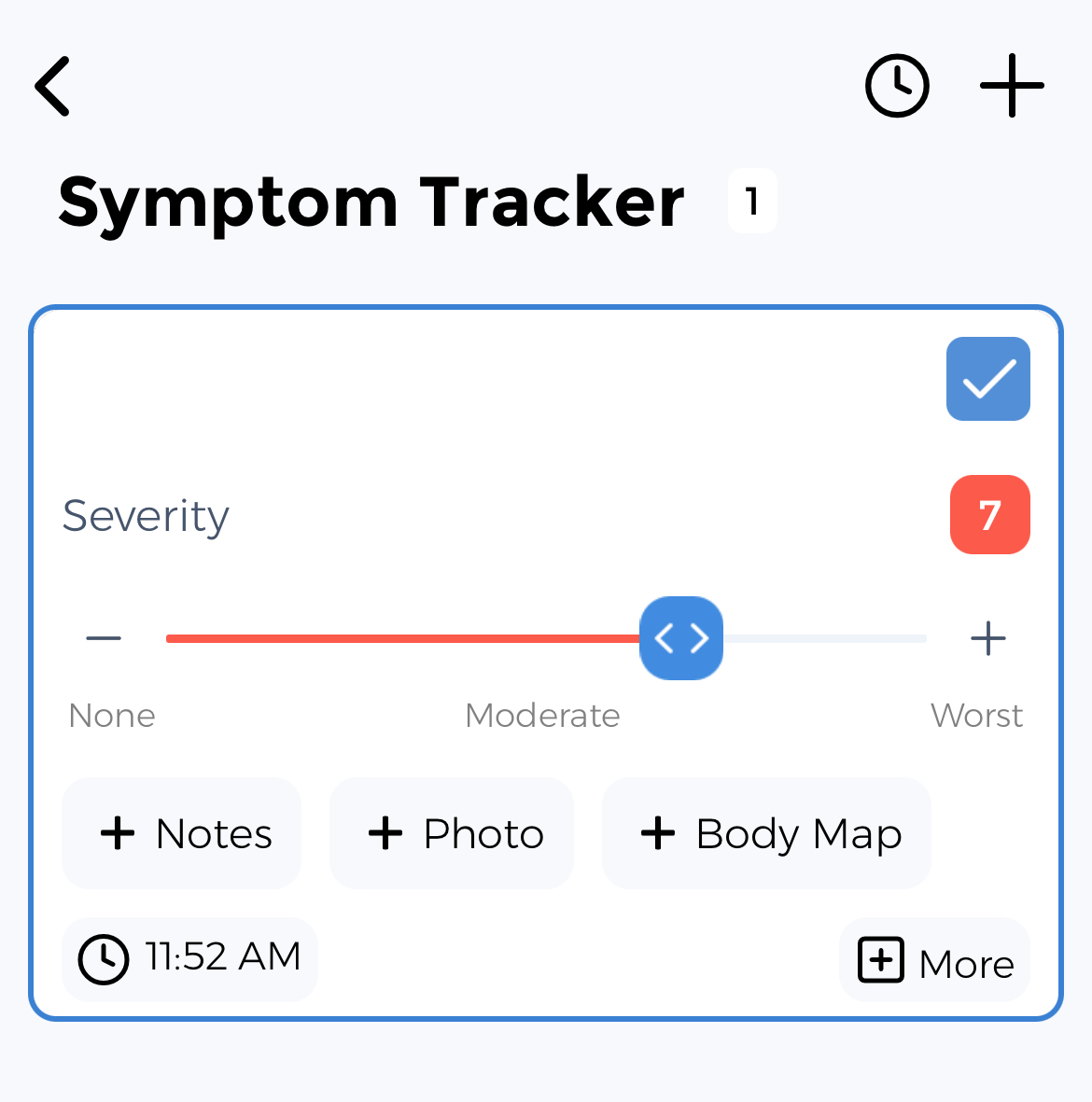Allergic Conjunctivitis Symptom Tracker: Your Health Assistant
Living with Allergic Conjunctivitis means dealing with eye redness, eye itching, watery eyes, and more. But here's the truth: Data is your most powerful tool. Every logged symptom reveals patterns—so you can take informed action.
Allergic conjunctivitis is an inflammatory reaction of the conjunctiva (the membrane covering the white of the eye) to allergens such as pollen, animal dander, or dust mites. It causes red, itchy, watery eyes and can be seasonal or perennial. Tracking symptoms, triggers, and treatment effectiveness helps manage the condition and improve quality of life.
Key Allergic Conjunctivitis Symptoms You Should Track
Struggling with symptoms like these? Tracking them reveals patterns, triggers, and how they impact your daily life.
Eye redness
Eye itching
Watery eyes
Burning sensation
Swollen eyelids
Eye discharge
Sensitivity to light
Eyelid crusting
Foreign body sensation
Blurred vision
Eye pain
Excessive tearing
Track Your Allergic Conjunctivitis Treatments
Tracking how these common treatments affect your symptoms can help you and your healthcare provider optimize your care plan:
Our tracker helps you monitor when you take medications and how they affect your symptoms over time.
Standardized Allergic Conjunctivitis Assessments
Complete these evidence-based assessments in the App to measure your severity and monitor your progress:
⚡ Knowledge Is Your Superpower
The difference between feeling overwhelmed by Allergic Conjunctivitis and feeling in control starts with data. When you track your symptoms, you transform uncertainty into clarity. Every data point brings you closer to understanding your unique patterns.
It's free to try for anyone—whether you're managing your own condition, supporting a child, helping an aging parent, or assisting a partner. Our tracker adapts to your specific role in the health journey.
How the CareClinic Allergic Conjunctivitis Symptom Tracker Adapts to Your Needs
Adults
Caregivers
Parents of Children
Young Adults
Your Complete Allergic Conjunctivitis Management Toolkit
Uncover Patterns & Insights
Map your Allergic Conjunctivitis symptoms like a detective solving a case.
Understand Your Medication's Impact
Turn guesswork into strategy. See how treatments affect your well-being with clear health insights.
Objectively Measure Your Progress
Use clinically validated tools to objectively measure your progress.
Other Tools You May Like...
Plus 4 more specialized tracking tools available
Access All Tracking ToolsAlso Supports Other Conditions Like
Allergic Rhinitis Tracker
Allergic Rhinitis warriors use our tracker to monitor sneezing, runny nose.
Atopic Dermatitis Tracker
Atopic Dermatitis warriors use our tracker to monitor dry skin, itching.
Asthma Tracker
Asthma warriors use our tracker to monitor wheezing, shortness of breath.
Dry Eye Syndrome Tracker
Dry Eye Syndrome warriors use our tracker to monitor eye dryness, eye irritation.
Success Stories from Our Community
"My doctor was impressed by the data I collected with this tracker. My eye pain improved dramatically when I adjusted stress management, which led to a completely new treatment plan that actually works."
"The most valuable feature for me was the weather condition tracker. When traditional approaches weren't enough, but after tracking consistently, I was able to plan activities with more certainty."
Take Control of Your Allergic Conjunctivitis Journey
Transform from feeling like a passive patient to becoming an informed self-advocate. Join thousands who've discovered new insights about their condition.
Designed by people who understand the daily challenges of managing chronic conditions, we're here to support you and your ❤️ ones.
Download Your Allergic Conjunctivitis Tracker NowYour Data is Protected
Private & Secure
HIPAA Compliant
GDPR Compliant
Never Sell Data
Your data is yours: You get full control over who can view your information. CareClinic keeps all your data secure and encrypted.
References based on studies by:

